- Home
- Cooper-Posey, Tracy
Broken Promise Page 2
Broken Promise Read online
Page 2
“France declared war on the empire, Nial. I’m in this, no matter which way you want to argue my birthright.” He strode to the dresser and pulled his hairbrush out of the toilet bag that sat there. He was barefoot, his shirt was untucked from his breeches and the sleeves rolled up to the elbows, the way he liked them when we were at home alone. His hair was loose from its ribbon.
Fear was chasing around in my chest. It was as bad as I had guessed, the moment I stepped into the room.
What could I say? The words I wanted to say were right there behind my teeth. I don’t want you to go. Worst of all was the pathetic demand wailing in my mind. I don’t want you to leave me. But I couldn’t say either of those things. As they had done from time to time in my life, human priorities were colliding with my longer-term viewpoint.
Sebastian was human. He could only see it from a human perspective. But I tried, anyway. “Wars are the most useless exercise humans have ever invented. Do you understand how childish this one is? The revoluntaries took over their country and now they are drunk on their success. If Europe ignored them, they would soon sober up and realize that running their new Republic was challenge enough.”
Sebastian brushed his hair out with hard yanks, and pulled it all to the back of his neck. He picked up the ribbon from the dresser. “You’re not involved in this, Nial. Italy hasn’t declared itself one way or the other. You can stay at home if you object. But I must go.”
Then I demonstrated just how childish I could be, too. Anger flared. “This isn’t your country, either!” I shot back. “You’re going to earn a ball through the head because of some displaced sense of loyalty!”
“Thank you for the reminder.” He pulled the top drawer open and lifted out the duelling pistols we kept there. “I’ll need them.” He threw them into the chest, where they landed with a heavy clatter, and started to unfold and straighten up his shirt sleeves. “This is as much your country as mine,” he said flatly. “You have lived here for years. But I know you will not get involved. You haven’t tied yourself to a country or an ideal in centuries. It is all beneath you now.”
I drew in a slow breath, trying to calm myself. This was getting out of hand. It was deteriorating. But I couldn’t seem to stop myself from speaking. “After seven years with me, it should be beneath you, too! Bastian, it’s just a war. It will pass and in two hundred years time, it will barely be remembered!”
Sebastian grew still. He looked at me squarely. “I don’t have two hundred years to spare to find that out,” he said softly. “This is the only time I have. I do not get to pick and chose which one of history’s events I’ll participate in. For better or worse, this is my life and there is a war happening. I have to go.”
“They haven’t called for men, yet. Let the standing army do what it is supposed to do.”
“For heaven’s sake, Nial, they’re executing people! Women! Children! Anyone at all who they even suspect has royal connections!” He was more than angry now. There was a powerful fury in his eyes, one I had never seen before.
For the first time since I had walked into the room, my better sense asserted itself. I kept my mouth shut. Something warned me that if I spoke a word, I would be jeopardizing everything I valued in this world.
Sebastian tucked his shirt into his breeches with hard, angry thrusts and picked up his discarded stockings from the bed and put them on. “They’re killing people because an accident of birth puts them on the wrong family tree,” he said, in a softer voice. He picked up his coat and shoes and looked at me over his shoulder. “My mother died because of an accident of birth,” he said flatly.
I knew then, what was driving him. “Dying in France will not fix what your father did to you.”
It was like he had not heard me. He walked to the door. “I’ll have the cab driver pick up the trunk.”
“Sebastian,” I said, reaching desperately for words, any words that would keep him here in the room. “Immortals cannot afford loyalty to anything. Countries fail, cities fall. Civilizations and people die. You must understand what it is like. I need you to see that.”
He slid the coat on, his head down, considering. Then he looked me in the eye again, his clear green-eyed gaze steady. “If that is true, then I never want to become an immortal. Promise me, Nathanial.”
Fresh horror rushed through me as I stared at him. How could I take it back? How could I fix this terrible mess? He was asking that I never turn him, that I let him live his horribly short, ineffective life and let him go.
“Promise me,” he demanded.
“Sebastian...” I began, and was so full of fear that I didn’t care that my voice was shaking.
“If you do not promise, I will walk out of here and never return. Do not lie to me, Nial. Say you promise me.”
If I promised, there was no guarantee that he would come back. If I did not promise, then it was certain he would not return. But I could not open my mouth. The words would have been so easy to speak. Two words that would fix this. But to speak them would be to lie. I couldn’t do it.
I did something very human. I fell prey to a temptation I should have known better than to give in to. I deliberately closed my mind to the long term consequences and thought only about the empty tomorrows, compared to the few short years I might have with him.
“I promise,” I said, the words miasmic in my mouth. But I meant them.
Sebastian nodded. “Goodbye, Nathanial.”
Then he was gone.
* * * * *
There have been few times in my existence as a vampire when I wished for the surcease of tears. I remember tears from my human life – I remember the pain they brought with them and mostly I am glad I cannot cry.
That night, I would have gladly given up all of my tomorrows if I could have shed a few tears and given vent to the agony inside.
* * * * *
I have been alone before, sometimes for decades. Moving through life without being able to share it with someone is for many humans a fate worse than death, but for vampires, it is the normal condition.
Once Sebastian left, however, I could not settle back into life. I was restless, unable to commit to any course of action, no matter how appealing. There were several scams Sebastian and I had begun to develop, and there was always the respectable and mostly honest card playing that supplemented our income nicely. None of them held enough appeal to move me to action.
I began to read the newspapers with closer attention. Before, newspapers had simply been a way of staying abreast of the affairs of man. Now I scoured the stories about the war abroad.
Two weeks after Sebastian had left, I received a bill from our tailor for the assembly of a uniform. The bill was itemized and described the uniform as that of a captain’s, appropriate for the 51st Battalion Afoot. Sebastian had purchased or been given an officer’s commission. I was proud of him.
It was also a lead that would tell me where he was. With renewed enthusiasm, I returned to the card club each evening. It was as well I did not intend to earn my keep, for I played badly and lost spectacularly. My mind was not focused enough. Perhaps their handsome winnings helped loosen the tongues of the players I invited to my table, and after two nights I learned that the 51st Battalion Afoot was part of the Duke of York’s first infantry regiment.
Reading the newspapers became an even more critical task. Now I knew what to look for, now that I had a regiment and battalion in mind, I found myself interpreting and double-guessing the news, which had become far too scanty to suit my growing unease.
I returned to the club once more and cultivated the friendship of any member who had any connection with the British Army, or the politicians directing it.
For many weeks, the news was confusing and contradicting. The coalition of European forces, which included Britain, had some early successes, but nothing decisive. As my contacts at the club got to know me, they began to speak more freely. They were worried about the lack of numbers and state of readiness of the arm
y, which had stagnated since the end of the American Revolution, some ten years before. Britain did not use conscription, so the only way to bolster their numbers was to call upon the loyalty and patriotism of England’s men. Unfortunately, the men that did answer the call were usually the sort who found the idea of being a foot soldier more appealing than the desperate life they were already leading. The recruits were mostly beggars, the homeless, ruffians moving only a few steps in front of the police, and destitute men from every large city in England.
There were very few men with an education, or the intelligence to lead who were buying commissions. The upper class had been virtually unmoved by the plea from the army.
Most of this I put together from the worried, off-hand comments of the club members. The conclusion was disheartening; the war was not going well.
Summer lengthened. In mid-August, I had the fortune to play with the Duke of Northumbria, who had a war posting with the Department of Defense. He had inherited his title only recently and was quite young. The excellent sherry they serve at the club did the rest.
“The Duke of York?” he said, reaching for another three cards, which would weaken his already pathetic hand. “He’s stuck with that simply awful siege.”
“Siege?” I asked casually, and picked up the sherry bottle. “More, my lord?”
“Oh, yes, thank you. Another glass would be perfectly wonderful.” He studied his cards. “Where was I? Oh, Dunkirk.” Then he frowned, his gaze unfocused. “I really shouldn’t say anything. Security and all that. You know.”
I assured him I understood perfectly and shifted the subject, while the first excitement I had felt in weeks prodded my heart into beating.
Dunkirk.
* * * * *
It took twelve days, and innumerable bribes to secure a passage from Dover. I finally found a cod fisherman who did not fear the open channel, and would take a passenger, especially one that was willing to work the lines and oars as necessary.
But he would not take me to Dunkirk. He knew of the trouble there, and the best I could arrange with him was passage to within a half-mile of Graveslines. He had a sturdy rowboat that I bought from him for a staggering price that moved him to a moment of generosity; he provided a jug of home-made mead to keep me warm.
I beached the rowboat on the shore of the river at Graveslines, and took the mead with me. It was fifteen miles from Graveslines to Dunkirk and I had no idea which army I would meet first.
As it happened, the coalition armies were south of Dunkirk. I ran into a small unit guarding the main road to Dunkirk, two miles south of the town. They were Portuguese, which was a language I knew and I offered them the mead, which was very well received. They had been guarding the road and the bridge across the river for two weeks and seen no one in that time. I had no trouble believing them. The countryside I had passed through had been empty of people. Rumor of war had spread, scattering the local citizenry and leaving towns and villages deserted.
I spun a story about searching for my brother, embroidering the tale just enough to make it sound believable. I was not wearing a uniform of any sort, which further helped. So did the mead. I was allowed to pass through, but they gave me no guarantees about my safety, for even they did not know the full deployment of the revolutionaries.
I took their warning to heart and eased off the road, travelling across the land. There were no more rivers to cross, so I was free to pick the angle of my approach. The road had been bending slightly inland after the bridge. I headed toward the coast, where I presumed the Duke’s forces were laying siege.
When I was close enough to see the deployment and colors of the various armies ranged around the city, I stopped and waited for sunset, and studied the assembled troops. Half-a-mile away, the fortified city of Dunkirk was surrounded by York’s troops. There were other uniforms that I did not recognize, but the English red coats were easy to spot.
Far to the right, inland from the city, were hastily built levies and on the other side of them, the French conscripts.
That observation, and the coalition sentries on the bridge told me that it was York who was laying siege to the French forces trapped inside Dunkirk’s defenses. The French huddled behind the levies were possibly waiting for reinforcement before trying to break the siege lines. It looked like the French were badly outnumbered.
Once it was fully dark, I was free to move as swiftly as I wished. I had selected black clothes when I had set out from London – I had suspected I would have to work my way between armies in the dead of the night. On first inspection I looked quite innocent and would pass as an older and worried brother bumbling around in the dark looking for the English, if I happened to be caught.
But I had three knives hidden away in various places on my body, and if there were no witnesses, I could use my full strength and speed to deal with anyone who got in my way.
I did not intend to barrel my way through the lines like a bowling ball, though. I took my time, slipping past units and battalions unchallenged because they did not hear me or see me.
I, however, learned much. Most of the soldiery deployed about the town were grumpy and bored with their siege duties. They sat about campfires, drinking and smoking, with nominal sentries posted in only the most obvious locations. I made note of the conversations I listened to, and moved on.
It was nearly eleven p.m. by the time I found Sebastian’s battalion on the north side of the town walls. There were several fires dotted about, inside their sentry line, which was alert and actively challenging newcomers. The sentries would make it more difficult to slide through, but not impossible.
Then I saw Sebastian. He stepped out of a tent, bending low to avoid the ropes, carrying a lantern with him. He looked very fine in his officer’s uniform, with the gold braid down the front of it. He had the dueling pistols tucked into the sash at his waist and the sword that was part of the uniform slapped at his side as he strode through his unit. He stopped to speak to his men briefly before moving on, beyond the sentries. From the direction of his walk, I judged he was reporting in to his superiors and would collect fresh orders, if there were any.
I withdrew from my position and eased my way around to the back of the tent. It took several minutes, for there were men on this side of the tent, too.
Finally, when I felt it was safe to do so, I worked my way under the back of the tent and straightened up, looking around.
The tent was Sebastian’s. I knew that instantly because his scent was thick upon the air, rising from the blankets on the pallet and the clothes piled upon the chest that he had packed in London. The chest sat next to the pallet.
The only other furniture in the tent was a small folding table and chair. On the table was an ink bottle and pen, and sheets of paper.
I settled at the table to wait, while listening to boots approach and pass by. The tent was shrouded in darkness. It would be most unlikely for a subordinate to enter when the captain was not there, so I was relatively safe.
Time passed. If Sebastian was even half the captain I knew he would be, then he would be taking the time on his way back from getting his orders to check with his men – a few conversations with key soldiers, to tally injuries and strengths, and the mood and morale of the unit.
I heard him long before the glow of the lantern heralded his return. I could hear his voice, speaking in low tones. It was easy to distinguish from among the murmur of the others. He was speaking easily, reassuring the men, his tone confident.
I picked up the pen and dipped the nib into the ink and began to write on the top most sheet.
Sebastian ducked under the flap of the tent, bringing his lantern with him. I instantly lifted my forefinger to my lips.
His eyes widened, then he glanced behind him to ensure the tent flap was lowered properly, hiding me from the view of his men. Then he looked back at me.
I tapped the sheet, and held it out to him. What I had written was simple enough.
Where can we talk witho
ut being interrupted?
Sebastian glanced at the words with a flicker of his eyes. I moved out of the way while he sat and wrote quickly, in his dashing, bold hand.
Ruined stable, north east, two miles.
Then he reached out and extinguished the lamp. It was possible that my silhouette against the tent sides had already been noted, but it was a risk I had wanted to take. Sebastian was a good captain – I had already seen the evidence for myself. He would be making use of locals for intelligence on the French, so his men would be used to strangers in his tent. As long as I left quickly, taking no more time than any messenger might, my visit would go unremarked.
Sebastian was blinking in the darkness, his human sight almost useless. I indulged myself; I rested my hand on his shoulder for a brief moment, feeling his warmth, and the rounded muscles beneath the coat.
Then I left, using the back flap once more.
It was easy to slip right through the ranks and units, now I had a direction to go. With a heart that was considerably lighter, I moved two miles north east and began to look for the old stable. It was a dilapidated building with lower walls of stone and mortar. The upper walls had once been timber. There was very little of the timber left, and the stone beneath was chipped and jagged, but the wide doorway proclaimed what the building had once been, as did the timber stalls inside. There was no roof, but the floor of the stable was sunk a foot or so below ground level, making what was left of the walls of the stalls higher than they first seemed.
There was nothing around the stable. The nearest troops were nearly a mile away, and there were no buildings left nearby – just the shells of an old farm house and lean-to for the animals. There was no moon. It was as dark as night can get.
I picked a stall in the middle of the stable and sat on the earth floor to wait, listening to the sounds of small animals moving in the spindly trees nearby. This time, Sebastian did not keep me waiting. It is possible he left the tent right after I had, only he would have left via the front flap, and stopped to ensure his sergeant was aware he was leaving.

 Heart Strike
Heart Strike Degree of Solitude
Degree of Solitude Kiss Across Blades
Kiss Across Blades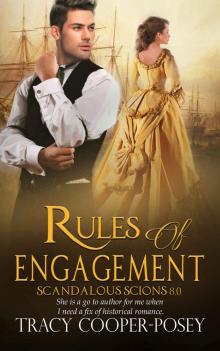 Rules of Engagement
Rules of Engagement Marriage of Lies
Marriage of Lies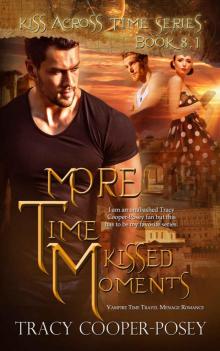 More Time Kissed Moments
More Time Kissed Moments Hunting The Kobra
Hunting The Kobra Black Heart
Black Heart Eva's Last Dance
Eva's Last Dance Solstice Surrender
Solstice Surrender Inconvenient Lover
Inconvenient Lover Lucifer's Lover
Lucifer's Lover Wait (Beloved Bloody Time)
Wait (Beloved Bloody Time) Diana by the Moon
Diana by the Moon Delly's Last Night (Go Get 'Em Women)
Delly's Last Night (Go Get 'Em Women) Heart of Vengeance
Heart of Vengeance Law of Attraction
Law of Attraction Southampton Swindle
Southampton Swindle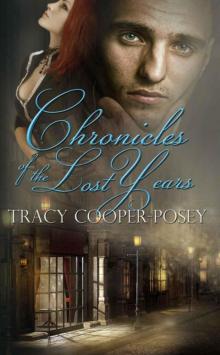 Chronicles of the Lost Years (The Sherlock Holmes Series)
Chronicles of the Lost Years (The Sherlock Holmes Series) V-Day
V-Day Kiss Across Time (Kiss Across Time Series)
Kiss Across Time (Kiss Across Time Series) Vale: A Short Erotic Vampire Romance Story
Vale: A Short Erotic Vampire Romance Story Dead Again: A Romantic Thriller
Dead Again: A Romantic Thriller Dangerous Beauty
Dangerous Beauty Blood Knot
Blood Knot Vivian's Return
Vivian's Return Veil of Honor
Veil of Honor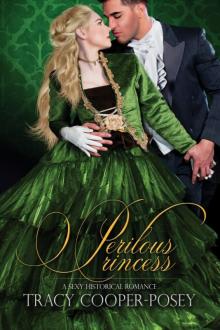 Perilous Princess: A Sexy Historical Romance
Perilous Princess: A Sexy Historical Romance Dead Double
Dead Double Broken Promise
Broken Promise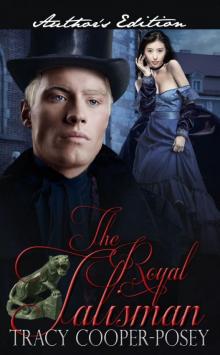 Royal Talisman
Royal Talisman